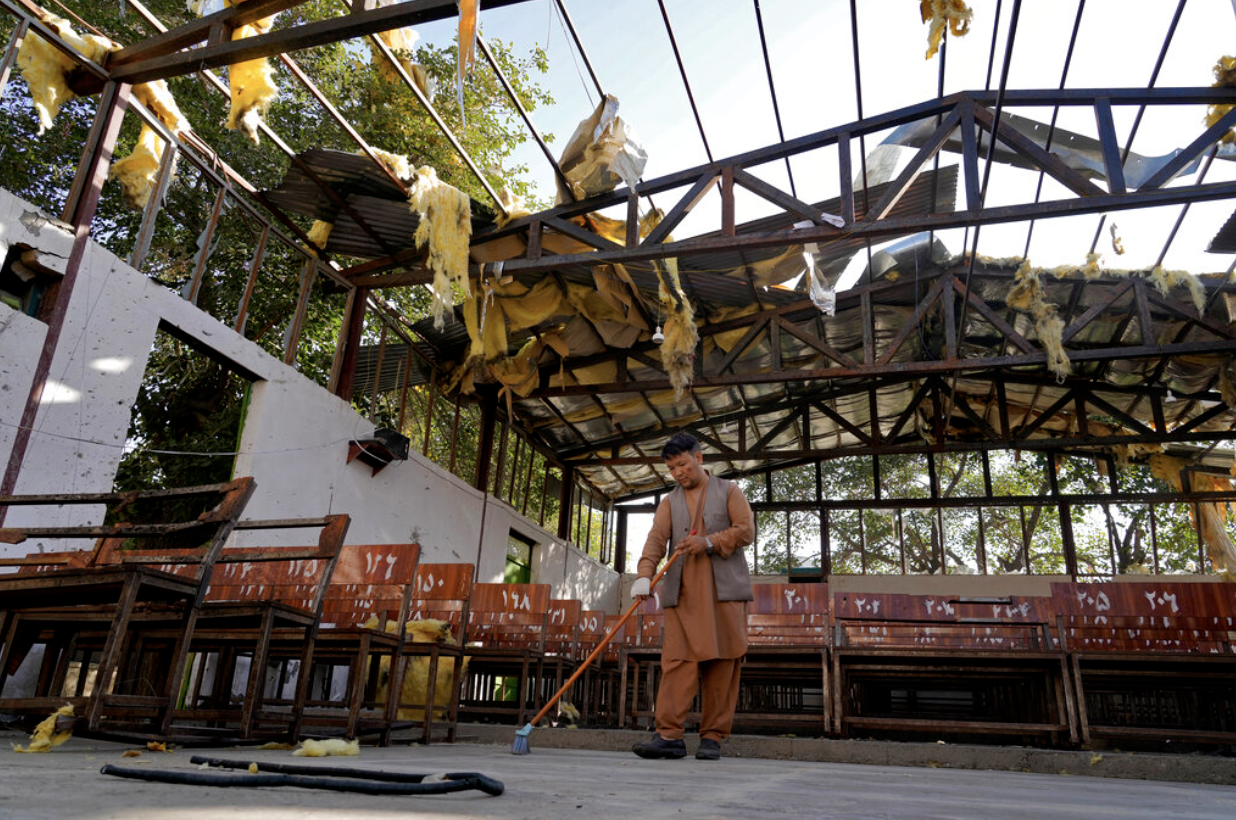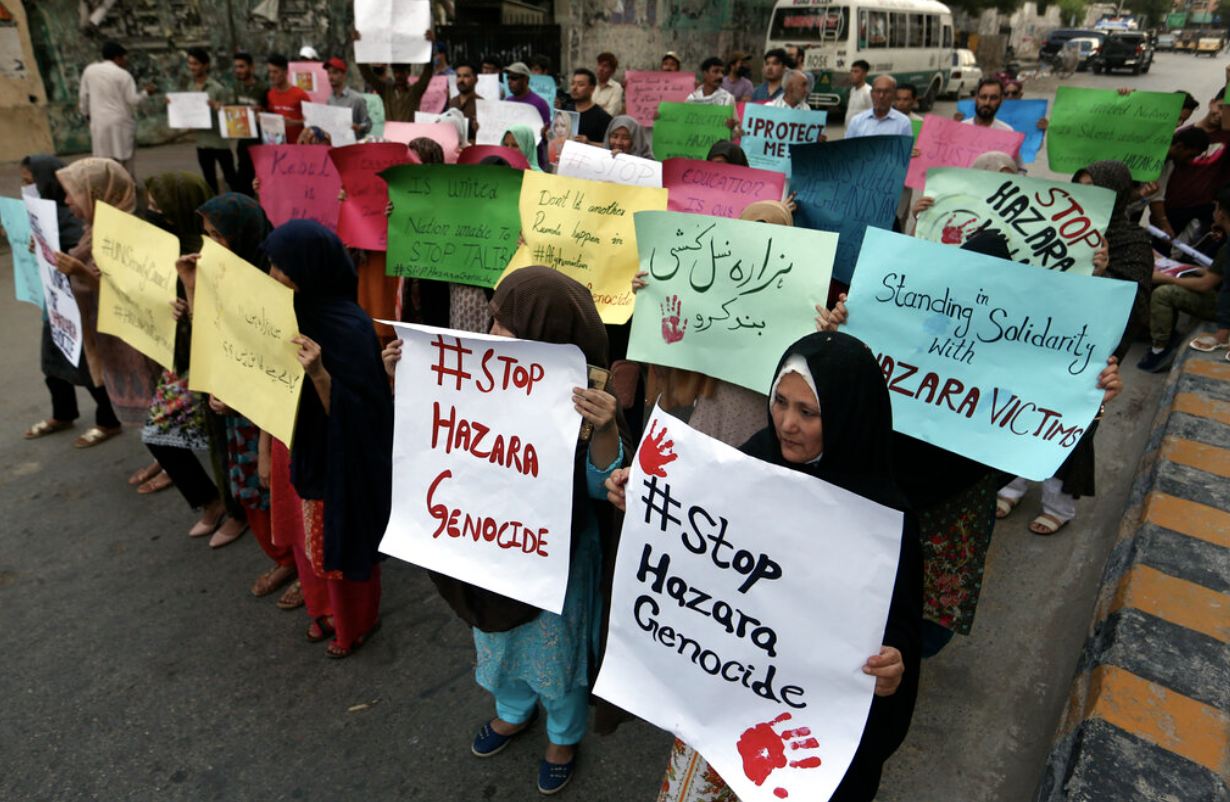Kabul School Bombing Signals Internal Problems with External Consequences
A man cleans the Hazara education center destroyed in the bombing in Kabul, Afghanistan on Sept.30. AP Photo/Ebrahim Noroozi
On September 30th, a suicide bomb attack occurred in a tutoring center in Dasht-e-Barchi, Afghanistan as students were taking a practice exam for college placement. The room, filled with anywhere between 400 and 600 students, was gender separated down the center by a curtain in line with Taliban instructions. The bomb was set off in the female half.
The U.N. Assistance Mission to Afghanistan (UNAMA) released an estimate of at least 43 killed by the blast, 46 of those being women and girls. At least a further 110 others were injured and “casualty figures [are] likely to rise further,” according to a UNAMA tweet.
Domestically, the bombing highlights the rampant extremist repression of the new Afghanistan and the inability, or the unwillingness, of the reigning Taliban government to fight extremist groups and terrorist cells within Afghanistan.
As with every outburst of violence in Afghanistan, the motives for the bombing are nuanced. The bombing took place in a majority Hazara Shiite area, a controversial and widely prosecuted minority in Afghanistan, with unclear responsibility. Both the Taliban and ISIS have been openly hostile to the Hazara community in the past. Protests erupted, mostly containing female Hazara college students, in universities across the country and calls for greater protection for minorities have been widespread.
Pakistani Hazara protesting the killing of Hazara women after the attack on a HAzara education center in Kabul, Afghanistan. AP Photo/Fareed Khan
Internationally, the bombing in Kabul is a prime example of the terrorist activity keeping out foreign investment - especially from China. China stands as Afghanistan's greatest potential ally thanks to immense investment potential, a shared border, and the Chinese policy of dealing with governments regardless of regime type.
The Taliban government desperately needs foreign aid and funding to repair and secure their war torn country and economy. Afghanistan offers China substantial untapped rare earth metal deposits right in China’s backyard. Chinese investment is a naturally an advantageous relationship for both China and the Taliban, it is being hamstrung by extreme security concerns in Afghanistan, specifically terrorism.
The Islamic State (IS) and Uyghur militant group activity has steadily increased since Taliban rule began, possibly including the attack in Kabul on Sept. 30. The Chinese embassy in Kabul recommended Chinese firms avoid Afghani projects in Dec. 2021 and has not withdrawn it, largely due to ongoing security concerns.
Uyghur insurgents, especially, pose a potent security risk to Chinese interests as the main area of operation for Uyghur insurgents is within China itself. The presence of any Uyghur militancy in Afghanistan an acute threat to Chinese interests - strikes would likely be directed at Chinese projects first in response to highly repressive actions undertaken by the Chinese government against the Uyghur people in China’s Xinjiang region.
China has never had strong qualms about government type to stop economic interaction and investment. Countries isolated by the West because of human rights or democracy issues have traditionally found a valuable trade and investment partner in China through foreign investment schemes. While some humanitarian aid has been provided by the Chinese government to Afghanistan, it has been inconsistent. Chinese parties cite security and terrorism as the main barriers that Afghanistan needs to overcome before investment can begin in earnest.
Western powers are no more likely to help. For the West, incidents like the Kabul bombing represent moral boundaries to aid and investment. On principle, no liberal democracy can invest in a repressive regime that cannot protect and actively prosecute minorities. Failures to protect minorities, like the bombing in Kabul, are poignient reminders to western leaders that Afghanistan is, to an unacceptable degree, a country of extreme repression and minority violence.
No one wants to help Afghanistan right now and incidents like the Kabul bombing illustrate why. International aid will likely remain universally lackluster or nonexistent unless serious progress on internal security and/or human rights issues is made by the Taliban government and attacks like the one in Kabul stop being regular occurrences.


